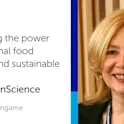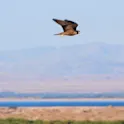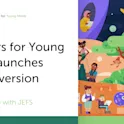1,071 news posts

Frontiers news
20 Oct 2023
Frontiers publishing partnerships: collaborating to advance open access
Head of publishing partnerships, Robyn Mugridge, reflects on Frontiers’ collaborations with societies and their contribution to accelerating open access. Credit: Frontiers At Frontiers we value partnerships with learned societies as a driving force, both in the academic publishing landscape and in the advancement of the open access movement. In collaboration with our society partners, we are proud to be accelerating impactful change in academic publishing. Leading their loyal membership base by example, our society partners are innovators with long-standing traditions and values. The Swiss School of Public Health is a case in point. Their pioneering Young Researcher Editorial (YRE) program was created for PhD students and their YRE Board sources and reviews opinion pieces, allowing members to accrue practical experience while also developing a working understanding of the academic publishing process. This commitment to community building, knowledge sharing, and the fostering of research excellence, makes societies crucial to the advancement of open access in all its forms. As trusted entities in the academic community, societies have the power to stimulate change and are positioned to fundamentally shape the narrative around open access. The Institute for Biomedical Science (IBMS), another of Frontiers’ society partners, chose to transition their journal, the British […]

Frontiers news
20 Oct 2023
Frontiers at the Charleston conference 2023: community, collaboration, and co-creation
Frontiers will, once again, be at the Charleston conference in South Carolina, USA this November and we’d love to see you there. As a diamond sponsor of the event, we’ll be leading and participating in a range of sessions outlined below. Credit: Frontiers Looking ahead to the conference Thomas Romano, global head of sales at Frontiers said: “Frontiers is excited to exhibit once again at this year’s Charleston conference. Our Institutional Partnerships team looks forward to reconnecting with librarians and consortia directors to learn more about your specific open access initiatives and goals, and to discuss pathways and models through co-creation that will remove the publishing burdens from researchers.” You can email us at institutions@frontiersin.org for more information or to arrange a meeting or just drop by and see us at booth 142. Join us at the following events at Charleston: Tuesday 7 November, 11:30am – 12:00noon, Salon 1 Galliard Center Shaping the future of open access through co-creation A vendor information session led by Thomas Romano, Global Sales Manager, Frontiers and Frank Hellwig, Frontiers. The transition towards a fully open access publishing landscape is essential to accelerate the scientific innovations urgently needed to solve the major global challenges we face (climate […]

Young Minds
19 Oct 2023
Frontiers for Young Minds and the Gairdner Foundation celebrate health research
The authors of the scientific articles for kids are recipients of the 2023 Canada Gairdner Awards. Photo credit: Frontiers Frontiers for Young Minds (FYM), the award-winning, open-access scientific journal for kids, published a new collection of articles on groundbreaking human health research in collaboration with the Gairdner Foundation, a Canadian organization dedicated to recognizing and rewarding major research contributions to future health worldwide. Established in 1957, the Gairdner Foundation recognizes international scientists for their excellence in fundamental biomedical research that will improve human health. This is done through the Canada Gairdner Awards, a series of eight awards given each year. Since the foundation’s beginning, there have been 418 Gairdner Award recipients from over 40 countries, 98 of whom have gone on to win the Nobel Prize. The partnership between Frontiers for Young Minds and the Gairdner Foundation is centered around their common goals of openly sharing information and inspiring the next generation of researchers. Through the articles, young readers are able to learn more about the world around them, while the young reviewers also learn about the scientific process. This supports young people in developing confidence and important skills such as critical thinking. The newly launched collection includes five articles […]

Engineering
18 Oct 2023
Do humans get lazier when robots help with tasks?
by Angharad Brewer Gillham, Frontiers science writer Image/Shutterstock.com ‘Social loafing’ is a phenomenon which happens when members of a team start to put less effort in because they know others will cover for them. Scientists investigating whether this happens in teams which combine work by robots and humans found that humans carrying out quality assurance tasks spotted fewer errors when they had been told that robots had already checked a piece, suggesting they relied on the robots and paid less attention to the work. Now that improvements in technology mean that some robots work alongside humans, there is evidence that those humans have learned to see them as team-mates — and teamwork can have negative as well as positive effects on people’s performance. People sometimes relax, letting their colleagues do the work instead. This is called ‘social loafing’, and it’s common where people know their contribution won’t be noticed or they’ve acclimatized to another team member’s high performance. Scientists at the Technical University of Berlin investigated whether humans social loaf when they work with robots. “Teamwork is a mixed blessing,” said Dietlind Helene Cymek, first author of the study in Frontiers in Robotics and AI. “Working together can motivate people […]

Featured news
16 Oct 2023
Chronic pain may increase dementia risk: Here are five Frontiers articles you won’t want to miss
by Deborah Pirchner, Frontiers science writer Image: Shutterstock.com At Frontiers, we bring some of the world’s best research to a global audience. But with tens of thousands of articles published each year, it’s impossible to cover all of them. Here are just five amazing papers you may have missed. Chronic pain associated with increased dementia risk Alzheimer’s disease and related dementias (ADRD) make up approximately 80% of the more than 47 million cases of dementia worldwide. Looking into the future, cases are expected to increase sharply in the coming decades. A large percentage of the older population is also affected by chronic pain, a leading cause of disability that shares many risk factors with ADRD. These include advanced age, depressive disorders, diabetes, obesity, social isolation, and a low level of education. Now, researchers in France have assessed the impact of chronic pain on the incidence of ADRD. They published their results in Frontiers in Aging Neuroscience. They found that the presence of chronic pain is associated with a higher incidence and risk of developing ADRD when compared with older adults with no chronic pain. The researchers stressed the importance of prevention, diagnosis, and management of chronic pain to limit resulting […]

Environment
13 Oct 2023
Caution, ocelot crossing: special wildlife exits on busy roads help protect endangered cat
By Mischa Dijkstra, Frontiers science writer Texas ocelot, Leopardus pardalis albescens. Image credit: Kline Lab, University of Texas Rio Grande Valley Traffic collisions are a major cause of death of endangered Texas ocelots. Researchers have now shown that recently designed wildlife exits, meant to allow ocelots to leave highways surrounded by fences, function as they are designed to do. 10 mammal species apart from ocelots learned to use them correctly. The authors concluded that these exits are a useful conservation measure in Texas, not only for ocelots. The Texas ocelot (Leopardus pardalis albescens) is endangered due to historic hunting, habitat loss, inbreeding, and traffic collisions. Today, only between 50 and 80 ocelots remain in the US, exclusively in Willacy and Cameron counties in southern Texas. These two populations are isolated from the larger one in northwestern Mexico by highways and urban development. “Here we show that a range of species, including middle-sized carnivores such as bobcats and coyotes, successfully use wildlife exits, a new type of mitigation structure specifically designed for the US endangered ocelot,” said first author Zarina Sheikh, a former graduate student at the University of Texas Rio Grande Valley, about their new study in Frontiers in Ecology […]

Featured news
12 Oct 2023
Cycling in school improves teenagers’ mental health, but wider social factors may impact benefits
by Deborah Pirchner, Frontiers science writer Image: Eric Arce for Outride Physical activity promotes mental well-being and finding activities that people are keen to engage in is key. For teenagers, cycling might be one of them – combining fun, competition, and transportation needs. Researchers in the US have examined if taking part in an in-school cycling program improves middle schoolers’ mental health and found positive effects. While they concluded that cycling programs may be a pathway to improved mental well-being of teenagers, they also noted that the conditions in which students are born and live in determine mental and physical well-being significantly. Physical activity has positive effects on mental health and yet, activity rates are declining. This is particularly worrying because the mental well-being of teenagers continues to deteriorate. In the US, one in six school children is diagnosed with some type of mental disorder. Riding bikes is a promising approach to introduce school-aged children to physical activity. Now, researchers in the US have investigated how adolescents’ psychosocial well-being changed after participating in a school-based cycling program. “Participation in a school cycling education program during the Covid-19 pandemic was associated with improved psychosocial well-being amongst middle schoolers in the US,” […]

Frontiers news
11 Oct 2023
Barbara Burlingame – Unraveling the power of traditional food systems and sustainable diets
Author: Catherine Rawlinson Dr Barbara Burlingame is a professor at Massey University, New Zealand. Her research predominantly focuses on nutrition science, and she is also involved in nutrition policy research at the global level. In relation to the United Nations Sustainable Development Goal 2: Zero Hunger, I spoke to Barbara about how her research over the years has contributed to nutrition policy and how this relates to providing sustainable diets for all. Photo credit: Barbara Burlingame Could you start by giving me an overview of your main areas of research? “At the moment, my main areas cover food composition, biodiversity for food and nutrition, human nutrient requirements, dietary assessments, and sustainable diets. Within sustainable diets, a large area of my work involves traditional food knowledge systems of Indigenous Peoples.” Some of your most recent work covers traditional food systems of Pacific Island countries. What can we learn from traditional systems to help sustain us for the future? “We can learn so much about nutrition and environmental sustainability from the traditional food and knowledge systems of Indigenous Peoples. We are also documenting the tragedy of the erosion of these systems through multiple factors, chief of which are climate change and the […]

Featured news
11 Oct 2023
Peregrine falcons set off false alarms to make prey easier to catch
by Angharad Brewer Gillham, Frontiers science writer Image: US Fish and Wildlife Service Pacific Southwest Region, public domain Can clever predators manipulate prey into taking bigger risks, making them easier to hunt? Scientists have found that, by carrying out attacks which force Pacific dunlins into exhausting evasive maneuvers, peregrine falcons increase the likelihood of successfully hunting those dunlins later. The prey birds are tired out or forced to forage at more dangerous times. Predators must eat to survive — and to survive, prey must avoid being eaten. One theory, the Wolf-Mangel model, suggests predators could use false attacks to tire prey out or force them to take bigger risks, but this has been hard to show in practice. Now, scientists observing peregrine falcons have found evidence that they deliberately exhaust their prey to improve later hunting success. “Although predators are imagined as clever in novels and movies, like the velociraptors in Jurassic Park, empirical biologists are generally not inclined to give much credence to such ideas,” said Dr Ronald Ydenberg of Simon Fraser University, lead author of the study in Frontiers in Ethology. “I have often been puzzled when watching raptors by aspects of their behavior, such as prominent perching […]

Frontiers news
06 Oct 2023
Frontiers supports the ITRE Committee’s recommendations to promote freedom of scientific research in the EU
Academic freedom is an ironclad principle in the scholarly world. Yet, we have observed that academic freedom has come under pressure in recent years. On 25 September 2023, the European Parliament Committee on Industry, Research, and Energy (ITRE) published a draft report on the promotion of the freedom of scientific research in the European Union (EU). This sentiment was echoed by Germany’s Minister of Science Bettina Stark-Watzinger in a guest article published in the Frankfurter Allgemeine Zeitung the same day. Photo credit: Frontiers Days earlier, on 19 September 2023, the European Parliament Committee on Industry, Research, and Energy (ITRE) convened to delve into a critical initiative championing the freedom of scientific research within the European Union (EU). Spearheaded by German rapporteur Christian Ehler, Member of the European Parliament for the European People’s Party, this initiative underscored the pivotal role of safeguarding academic freedom. The discussion resonated with concerns about academic liberties, especially in light of events like the expulsion of “a Hungarian university,” highlighting the paramount importance of upholding the rule of law. Christian Ehler shared insights into a worrying precedent set by the Hungarian university case, where academic freedom faced a disconcerting threat. The name of the university was […]

Featured news
06 Oct 2023
Our sense of smell changes the colors we see, show scientists
By Mischa Dijkstra, Frontiers science writer Crossmodal associations occur when people make unconscious but stereotypical connections between two or more senses. Here, scientists showed that associations between odors and colors can be particularly strong: powerful enough to distort our perception of colors. Our five senses bombard us with environmental input 24/7. One way our brain makes sense of this abundance of information is by combining information from two or more senses, such as between smells and the smoothness of textures, pitch, color, and musical dimensions. This sensory integration also causes us to associate higher temperatures with warmer colors, lower sound pitches with less elevated positions, and colors with the flavor of particular foods – for example, the taste of oranges with the color of the same name. Now, a study in Frontiers in Psychology has shown experimentally that such unconscious ‘crossmodal’ associations with our sense of smell can affect our perception of colors. “Here we show that the presence of different odors influences how humans perceive color,” said lead author Dr Ryan Ward, a senior lecturer at Liverpool John Moores University in Liverpool, UK. Sensory-deprived room Ward and colleagues tested for the existence and strength of odor-color associations in 24 […]

Featured news
05 Oct 2023
Frontiers for Young Minds: New partnership launches French-language version of kids’ scientific journal
Frontiers for Young Minds, an award-winning, non-profit, open-access scientific journal for kids, in partnership with Jeunes Francophones et la Science, has launched a French version as part of a wider strategy to bring accessible, high-quality science to global audiences. The expansion provides free access to scientific articles for 300 million French speakers around the world. Photo credit: Frontiers Frontiers for Young Minds publishes articles written by renowned researchers and peer-reviewed by children between the ages of 8-15. The young reviewers work alongside the scientists, providing feedback to make sure the articles are engaging and understandable for their peers before publication. The unique review process empowers the young reviewers with a better understanding of the scientific process and provides them with critical thinking skills. Jeunes Francophones et la Science (JEFS) is a not-for-profit organization that is passionate about communicating quality science to young, French-speaking learners. As part of the partnership, JEFS will translate existing articles into French, support French-speaking researchers in writing original scientific articles for young learners, and introduce the journal’s innovative kid-led peer review process to a network of French-speaking science mentors and schools. The first group of translated articles focus on microbiology and include: An Incredible Invisible World: […]

Environment
05 Oct 2023
Can masculine marketing convince more men to eat vegan?
by Angharad Brewer Gillham, Frontiers science writer Image/Shutterstock.com Eating more plant-based dishes is good for your health and good for the planet – but the perception that these dishes are for women and not for men may be stopping some men from choosing plant-based meals. Scientists found that you can present vegan dishes with a masculine framing, altering the perception that these dishes are for women, but changing the perception doesn’t change people’s preferences. Eating more plant-based meals is better for our health and better for the planet. But cultural preferences are significant barriers to reducing meat consumption – especially for men, who are underrepresented among vegans and vegetarians. Studies have found that eating meat is associated with masculinity, and that gender stereotypes label plant-based diets as suitable for women but not men. So is it possible to change the perception of plant-based food with marketing, and convince men to eat more of it? “Men might be less inclined to consume vegan food due to the need to perform gender,” said Alma Scholz, lead author of a new study published in Frontiers in Communication. “However, with vegan food being framed in a masculine way, men might feel less resistance and […]

Research Topics
04 Oct 2023
Frontiers’ most popular mental health Research Topics
On World Mental Health Day 2023, the World Health Organization (WHO) declared mental health a fundamental human right that should be accessible to everyone, regardless of location or background. In support of WHO’s mission, we have compiled a list of leading article collections advancing mental health research. Collecting over a million views, scientists investigated emotional, psychological, and social well-being subjects, including: Post-COVID-19 habit changes 70 articles | 149,000 views Analyzing COVID-19’s impact on mental health, lifestyle, beliefs, and social behavior Insights from Frontiers for Young Minds 7 articles | 315,000 views Explaining different ways to help those with mental illness Mental health awareness 34 articles | 145,000 views Developing strategies for promoting mental health across all disciplines Mental health in higher education 35 articles | 145,000 views Exploring solutions to promote students’ mental well-being Mental health literacy 19 articles | 64,000 views Learning how to achieve and maintain positive mental health while reducing stigma Cross-cultural perspectives 15 articles | 54,000 views Examining positive and negative mental health concepts across different cultures Mental health of healthcare workers 23 articles | 52,000 views Focusing on the mental health of different healthcare professionals Coping with change 29 articles | 47,000 views Investigating the […]

eBooks
04 Oct 2023
Frontiers ebook releases: October 2023
Download the top ebook releases from this month, including: exploration of psychology and mathematics education work on emerging technologies for musculoskeletal disease new perspectives on ovarian aging and reproduction and contributions to climate change research All ebooks are free to download, share and distribute. Shape the future of your field — and publish your own ebook — by editing a special collection around your research area. Learn more about Research Topics or submit your suggestion. Psychology and Mathematics Education Edited by Gila Hanna; Laura Macchi; Karin Binder; Laura Martignon; Katharina LoiblPDFClimate Change and Society Edited by Fátima Alves; Luísa SchmidtPDFMovement and Connectivity of Large Pelagic Sharks Edited by David Wells; J. Marcus Drymon; Clive N. Trueman; Yannis Peter Papastamatiou; Johann Mourier; Mark MeekanPDFOvarian Aging and Reproduction Edited by Wenpei Xiang; Jing Li; Huai L. Feng; Yingying QinPDFMultilateral Interactions In The Rhizosphere Edited by Soumitra Paul Chowdhury; Adam Schikora; László Kredics; Fred O Asiegbu; Beatriz LagunasPDFAdvancing the Understanding of Emergence of SARS-CoV-2 Genetic Variants and COVID-19 Vaccine Efficacy: Essential Clinical and Molecular Insights and Breakthroughs Edited by Alagarraju MUTHUKUMAR; Madhusudhanan Narasimhan; Ruben LuoPDFBioinformatics Analysis of Omics Data for Biomarker Identification in Clinical Research, Volume II Edited by Lixin Cheng; Hongwei Wang; Shibiao […]